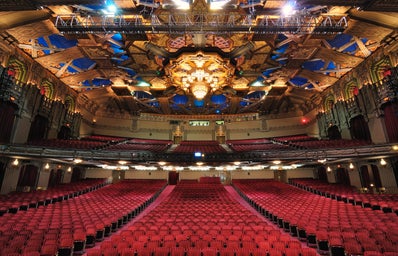The Taming of the Shrew, a play about gender and power, has been turned on its head in this production by the Royal Shakespeare Company. The play is still set in the era of its production; however, society is a matriarchy. Women take centre stage throughout with the role reversal, displaying power and wealth as the dominant gender, while the male characters are relatively passive, or else they are tamed. The traditional masculine ideal of control over a compliant and obedient wife is flipped. Katherine, who is now the boisterous son of Baptista Minola, is tamed by the female Petruchia. His newfound subservience culminates in the final monologue about male duty to their wives.
I’d not read or seen the play before this week: somewhat controversially as an English student, I’ve never been a huge fan of Shakespeare. Before university, I’d only studied Romeo and Juliet at school, and that consisted of watching the Leo film and calling it ‘revision’. However, I took a module in first year on the Plantagenet History plays and realised that Shakespeare could be enjoyable. Since then, I’ve seen two shows by the RSC and the more light-hearted Sh*t Faced Shakespeare, so you could say I’ve been converted to seeing Shakespeare on the stage.
The play was genuinely funny – the audience laughed throughout at the asides and sketchy dialogue. I think the audience favourite had to be Trania, who is the maid of Lucentia, and pretends to be her in a deceptive act of helping Lucentia and Bianco fall in love. The swapping of roles was the main source of comedy through her explicit gestures to perform her new identity as a gentlewoman, every time she extravagantly threw her arms in the air the audience roared, and the performance bordered on ludicrous by the end. To everyone’s disappointment, she resorts back to being a maid, and I couldn’t help but wonder if their comic relationship would be affected by Lucentia’s marriage to Bianco. The production was also visually appealing. The elaborate costumes of the female characters were a treat for the eyes. Due to being close to the front, I felt immersed in the exuberant Elizabethan Italy along with the ensemble singing performances that added to the jostling atmosphere of the 16th-century setting.
The gender-swapping of the play, however, still left a complicated message behind. The male and female role-reversal did give women more power and privilege in the dramatic world. Yet, it could be read as still endorsing unequal power relations. I know the humour and satire challenges this reading – however, surely this attitude of a female-gendered power imbalance is equally problematic to a contemporary audience?
4/5 – Overall, it was a great night of theatre and much better than I expected it to be!


